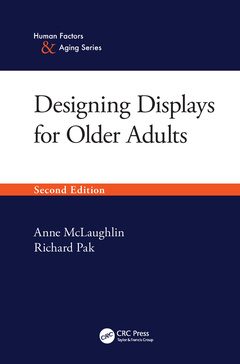Designing Displays for Older Adults, Second Edition (2nd Ed.) Human Factors and Aging Series
Auteurs : McLaughlin Anne, Pak Richard

This book focuses on the design of displays and user interfaces for the older user. Aging is related to complex mental, physical, and social changes. While conventional wisdom says getting older leads to a decline, the reality is that some capabilities decline with age while others remain stable or increase. This book distills decades of aging research into practical advice on the design of displays. Technology has changed dramatically since the publication of the first edition. This new edition covers cutting-edge technology design such as ubiquitous touchscreens, smart speakers, and augmented reality interfaces, among others.
Anne Collins McLaughlin is a Professor in the Department of Psychology at North Carolina State University. She directs the Learning, Aging, and Cognitive Ergonomics Lab (the LACElab) and serves as the Area Coordinator for the Ph.D. program in Human Factors and Applied Cognition. Her research interests include understanding how learning tends to change with age and how to best design interfaces and training programs for older persons. She received her Ph.D. in psychology at the Georgia Institute of Technology in 2007.
Richard Pak is a Professor in the Department of Psychology at Clemson University. His primary research interests are aging and human factors, and the issues surrounding the design and use of autonomous technology. He received his Ph.D. in psychology at the Georgia Institute of Technology in 2005. He directs the Cognition, Aging, and Technology Lab at Clemson University.
Date de parution : 05-2020
15.6x23.4 cm
Date de parution : 05-2020
15.6x23.4 cm
Thèmes de Designing Displays for Older Adults, Second Edition :
Mots-clés :
Indirect Input Device; User Experience; Vice Versa; Accessible Design; Age Related Hearing Loss; Augmented Reality; Suggested Readings Section; Artificial Intelligence; User Centered Design Process; Human-Computer Interaction; Mixed Reality Systems; User-Interface; Smart Speaker; ubiquitous touchscreens; Self-driving Cars; audio interfaces; Pie Menu; older adults; Heuristic Evaluation; Hearing Impairments; AR System; Task Scenario; UCD; Progressive Disease; Intraocular Lens; Score Keeper; Digit Symbol Substitution Test; Auditory Display; Public Housing Residence; National Highway Transportation Safety Administration; Hamburger Menu; Working Memory; Paper Prototyping; Probable Response Time



